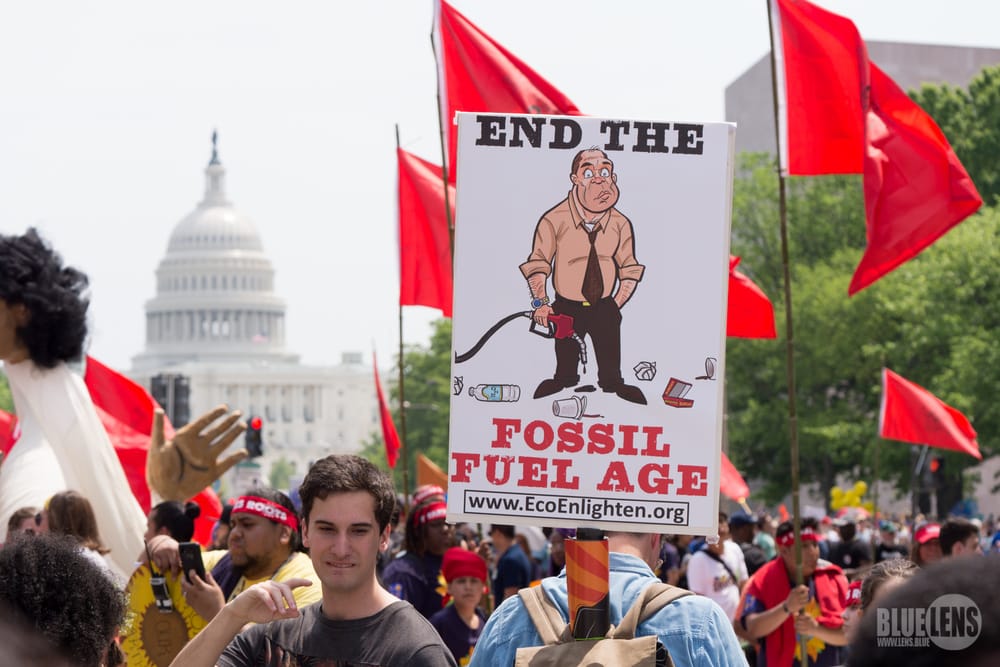Fuelling the resistance
Naomi Pratt addresses the global struggle against extractivism

The greatest obstacle to action on climate change is the one most often missing from discourse: the fossil fuel industry. Since comprehension of anthropogenic global warming began, the fossil fuel industry has been ignored in negotiations and subsidised by governments. Much time and energy has been spent over the past decades to reduce consumption of fossil fuels and greenhouse gas emissions, both on an individual as well as on a collective level. However, whether the fix is energy-saving light bulbs or the Paris Agreement, our efforts are undermined by the refusal to address fossil fuel supply. A striking example of this cognitive dissonance is the UK’s commitment to an 80% reduction in emissions by 2050 under the Climate Change Act (2008); now rendered virtually worthless by the Infrastructure Act (2015) which forces future governments to maximise UK petroleum recovery. The fossil fuel industry spends millions on PR and CSR (corporate social responsibility) to craft a wholesome and generous public image. They also invest large amounts in lobbying efforts, in order to exert political influence and ensure that extractivism continues unabated. Their primary obligation is to their shareholders, requiring ‘sustainable’ growth and profitability: a goal which requires continual exploration. Once fossil fuels are extracted, they are inevitably going to be burnt; if not in the country of production, then they will be exported and burnt elsewhere. If we are to achieve climate justice, fossil fuels must be, quite simply, kept in the ground.
These companies, therefore, must dramatically change their operations; if they won’t, then society must allow them to fail. Big Oil has gone to huge lengths already to defend business as usual, from sponsoring climate denying politicians to supporting wars against civilians, suggesting that they are unlikely to change, and their failure is our only hope.
Outside of our corner of the world blinkered by consumerism, direct resistance against Big Oil has been raging for decades. In some of these ‘sacrifice zones’, oil companies and the regimes they support can literally get away with murder, as was the case in the brutal treatment of the Ogoni in the Niger Delta. In this case Shell settled to the tune of $15.5m, after a long struggle by local people whose home and livelihoods were devastated by the industry’s actions.
Localism is a potent tool when resisting resource extraction – voices with strong ties to place and landscape bring forward social justice as a cornerstone of the environmental movement. No struggle reflects this more than the powerful defiance of the Standing Rock Sioux at Oceti Sakowin protest camp, recently broken up in a highly militarised expulsion. Indigenous activists engaged in peaceful civil disobedience for months in protest to the Dakota Access Pipeline, a project which disregards their land treaty rights in an extension of the oppression Native Americans have long suffered. Support reverberated throughout the US, including a thousand-strong march on Washington, and continues through legal action and divestment. The pipeline, which could become fully operational this year, has already had its first spill.
Though cries of ‘nimby (Not In My Back Yard) -ism’ can often be heard from defenders of the industry, and echoed tacitly by governments overriding local consent, those on the front line are fighting for everyone’s back yard, not just their own. In 2014, prominent writer Naomi Klein defined the term ‘Blockadia’: a new transnational zone of conflict where people whose lives are at the border with extractive industries fight for control over their water, soil and air.
Despite already holding more fuel in reserves than we can safely burn, continuing with exploration – using ever riskier methods – means the industry now faces battles on multiple fronts. Communities which have historically been more privileged are joining the struggles alongside marginalised people who have been long-standing opponents. As the UK prepares to extract its full hydrocarbon resources, swathes of the British countryside have become the new sacrifice zones. It is not only activist groups such as ‘Frack Off’ and ‘Reclaim the Power’ who are resisting the dash for gas. Local people from the South East, Lancashire, and Yorkshire are also joining the resistance, as they realise the destruction that fracking could cause to their towns.
Direct action against extractivism becomes even more powerful when supported by pressure from behind the front lines. Campaigns which target the carefully and expensively crafted image of fossil fuel companies are already clocking major blows. Creative protests from activist groups ‘Platform’, ‘Liberate Tate’ and ‘BP or not BP’ have succeeded in driving out oil company branding from such cherished public institutions as the Science Museum, the Tate, and the Edinburgh International Festival. As the tally of divested funds approaches $5.5 trillion, cracks are starting to show: the Saudi oil minister recently advised the industry to thwart the campaign to ‘Keep it in the ground’ in order to shed its ‘Dark Side’ image.
The less political power the fossil fuel industry wields, the smoother the path to a low-carbon world, where environmental regeneration can begin. Speaking at a Carbon Trust dinner in 2015, former Shell chairman Mark Moody-Stuart admitted that “18 years after major oil companies acknowledged the threat of climate change...the industry has made remarkably little progress”. Big Oil has shown its hand. It’s time to show ours.










